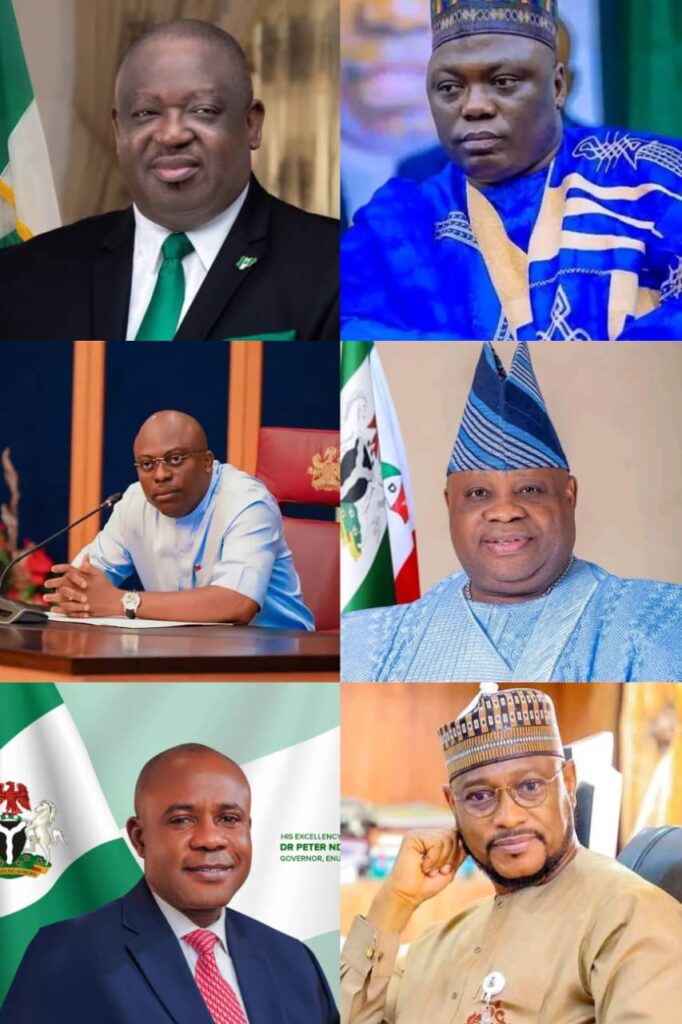News Analysis: By Abdul Lauya
As Nigeria approaches the 2027 general elections, six first-term governors elected under the banner of the opposition Peoples Democratic Party (PDP) are caught in a growing political storm, one that may determine not only their individual futures but also the fate of Nigeria’s struggling democracy.
Governors Ademola Adeleke of Osun, Peter Mbah of Enugu, Caleb Mutfwang of Plateau, Dauda Lawal of Zamfara, Siminalayi Fubara of Rivers, and Kefas Agbu of Taraba came into office in 2023 with fresh mandates and public expectations.
But their tenure is already being tested, not just by governance challenges in their states, but by a party that is visibly faltering under the weight of internal wrangling, defections, and strategic confusion.
The PDP, once Nigeria’s most formidable political machine, is currently a shadow of its former self. What began as post-election discontent has grown into open warfare among party leaders.
The influence of FCT Minister Nyesom Wike, a PDP member with significant ties to the ruling All Progressives Congress (APC), has deepened the crisis. His political maneuverings and refusal to fully sever ties with the party have caused tensions to fester and trust to erode within the ranks.
Wike’s grip on Rivers politics, in particular, has placed Governor Fubara in an uncomfortable position, with the latter now entangled in a power struggle that threatens to explode at any moment.
Beyond Wike’s role, the broader PDP structure is fraying. National cohesion is weak. Governors and stakeholders are increasingly operating in silos. The party has failed to present a clear direction, fueling speculations that more defections are imminent.
For the six first-term governors, the landscape is politically hazardous. Remaining in the PDP may be seen as a principled stance, but it could also mean going into 2027 with a fractured party unable to provide meaningful support during re-election bids.
On the other hand, the APC, now firmly in control of federal power, presents a tempting alternative. The ruling party offers not just access to resources, but also the machinery of state influence. Defecting could guarantee political survival, but at the cost of credibility.
With crowded ambitions in the APC and internal rivalries already brewing ahead of the next general election, even defections come with uncertainty. There is also the risk of backlash from voters who may perceive such moves as opportunistic or self-serving.
A third option, though less defined, is the growing appeal of alternative platforms. The Labour Party’s 2023 outing under Peter Obi, and the more modest presence of parties like the African Democratic Congress (ADC), show that Nigerians are increasingly open to a third force, especially one driven by anti-establishment sentiment.
But Nigeria’s political history is unkind to third parties. They often lack national structure, elite support, and deep funding. For these governors, aligning with one could be either a bold recalibration, or a political misstep.
Whatever paths they choose, their decisions will shape not just their futures but also the complexion of Nigeria’s political opposition. If they hold the line within the PDP and push for reforms and reconciliation, they may spark a revival. If they defect to the APC en masse, the PDP risks slipping into irrelevance, and Nigeria could inch closer to de facto one-party dominance.
If they pivot toward a new coalition, they may change the political narrative entirely, or simply dilute opposition strength.
Ultimately, 2027 is more than just another election year. For these shaky first-term governors, it is a moment of reckoning. Their choices in the coming months will determine whether they emerge as leaders of a renewed opposition or casualties of Nigeria’s unrelenting political chess game.
The future of competitive democracy in Nigeria may very well hinge on the resolve, direction, and political courage of this emerging crop of governors.


